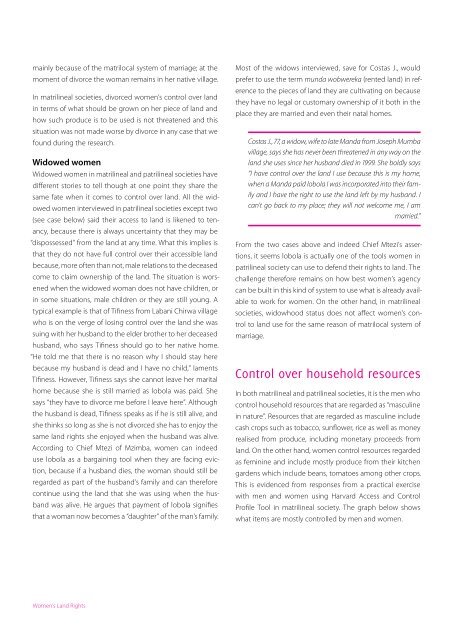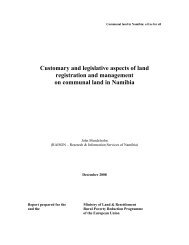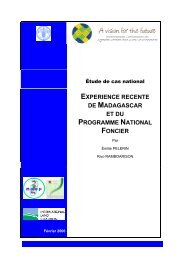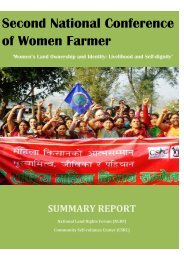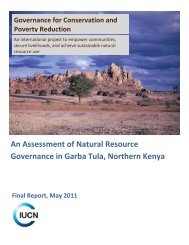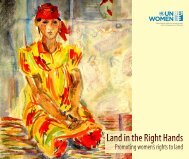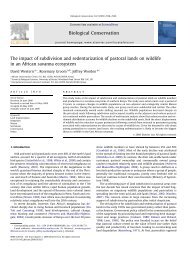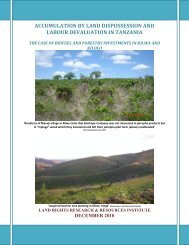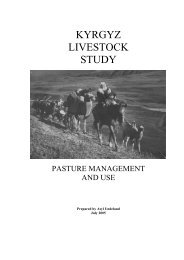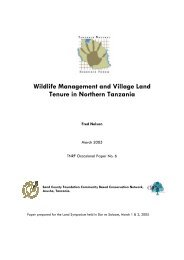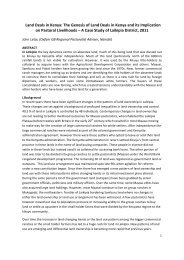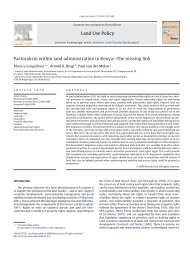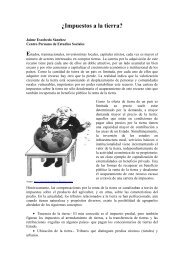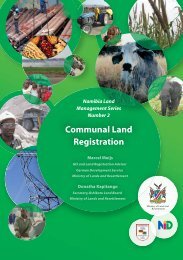Women's access to land and household bargaining power
Women's access to land and household bargaining power
Women's access to land and household bargaining power
Create successful ePaper yourself
Turn your PDF publications into a flip-book with our unique Google optimized e-Paper software.
mainly because of the matrilocal system of marriage; at the<br />
moment of divorce the woman remains in her native village.<br />
In matrilineal societies, divorced women’s control over <strong>l<strong>and</strong></strong><br />
in terms of what should be grown on her piece of <strong>l<strong>and</strong></strong> <strong>and</strong><br />
how such produce is <strong>to</strong> be used is not threatened <strong>and</strong> this<br />
situation was not made worse by divorce in any case that we<br />
found during the research.<br />
Widowed women<br />
Widowed women in matrilineal <strong>and</strong> patrilineal societies have<br />
different s<strong>to</strong>ries <strong>to</strong> tell though at one point they share the<br />
same fate when it comes <strong>to</strong> control over <strong>l<strong>and</strong></strong>. All the widowed<br />
women interviewed in patrilineal societies except two<br />
(see case below) said their <strong>access</strong> <strong>to</strong> <strong>l<strong>and</strong></strong> is likened <strong>to</strong> tenancy,<br />
because there is always uncertainty that they may be<br />
“dispossessed” from the <strong>l<strong>and</strong></strong> at any time. What this implies is<br />
that they do not have full control over their <strong>access</strong>ible <strong>l<strong>and</strong></strong><br />
because, more often than not, male relations <strong>to</strong> the deceased<br />
come <strong>to</strong> claim ownership of the <strong>l<strong>and</strong></strong>. The situation is worsened<br />
when the widowed woman does not have children, or<br />
in some situations, male children or they are still young. A<br />
typical example is that of Tifiness from Labani Chirwa village<br />
who is on the verge of losing control over the <strong>l<strong>and</strong></strong> she was<br />
suing with her husb<strong>and</strong> <strong>to</strong> the elder brother <strong>to</strong> her deceased<br />
husb<strong>and</strong>, who says Tifiness should go <strong>to</strong> her native home.<br />
“He <strong>to</strong>ld me that there is no reason why I should stay here<br />
because my husb<strong>and</strong> is dead <strong>and</strong> I have no child,” laments<br />
Tifiness. However, Tifiness says she cannot leave her marital<br />
home because she is still married as lobola was paid. She<br />
says “they have <strong>to</strong> divorce me before I leave here”. Although<br />
the husb<strong>and</strong> is dead, Tifiness speaks as if he is still alive, <strong>and</strong><br />
she thinks so long as she is not divorced she has <strong>to</strong> enjoy the<br />
same <strong>l<strong>and</strong></strong> rights she enjoyed when the husb<strong>and</strong> was alive.<br />
According <strong>to</strong> Chief Mtezi of Mzimba, women can indeed<br />
use lobola as a <strong>bargaining</strong> <strong>to</strong>ol when they are facing eviction,<br />
because if a husb<strong>and</strong> dies, the woman should still be<br />
regarded as part of the husb<strong>and</strong>’s family <strong>and</strong> can therefore<br />
continue using the <strong>l<strong>and</strong></strong> that she was using when the husb<strong>and</strong><br />
was alive. He argues that payment of lobola signifies<br />
that a woman now becomes a “daughter” of the man’s family.<br />
Women’s L<strong>and</strong> Rights<br />
Most of the widows interviewed, save for Costas J., would<br />
prefer <strong>to</strong> use the term munda wobwereka (rented <strong>l<strong>and</strong></strong>) in reference<br />
<strong>to</strong> the pieces of <strong>l<strong>and</strong></strong> they are cultivating on because<br />
they have no legal or cus<strong>to</strong>mary ownership of it both in the<br />
place they are married <strong>and</strong> even their natal homes.<br />
Costas J., 77, a widow, wife <strong>to</strong> late M<strong>and</strong>a from Joseph Mumba<br />
village, says she has never been threatened in any way on the<br />
<strong>l<strong>and</strong></strong> she uses since her husb<strong>and</strong> died in 1999. She boldly says<br />
“I have control over the <strong>l<strong>and</strong></strong> I use because this is my home,<br />
when a M<strong>and</strong>a paid lobola I was incorporated in<strong>to</strong> their family<br />
<strong>and</strong> I have the right <strong>to</strong> use the <strong>l<strong>and</strong></strong> left by my husb<strong>and</strong>. I<br />
can’t go back <strong>to</strong> my place; they will not welcome me, I am<br />
married.”<br />
From the two cases above <strong>and</strong> indeed Chief Mtezi’s assertions,<br />
it seems lobola is actually one of the <strong>to</strong>ols women in<br />
patrilineal society can use <strong>to</strong> defend their rights <strong>to</strong> <strong>l<strong>and</strong></strong>. The<br />
challenge therefore remains on how best women’s agency<br />
can be built in this kind of system <strong>to</strong> use what is already available<br />
<strong>to</strong> work for women. On the other h<strong>and</strong>, in matrilineal<br />
societies, widowhood status does not affect women’s control<br />
<strong>to</strong> <strong>l<strong>and</strong></strong> use for the same reason of matrilocal system of<br />
marriage.<br />
Control over <strong>household</strong> resources<br />
In both matrilineal <strong>and</strong> patrilineal societies, it is the men who<br />
control <strong>household</strong> resources that are regarded as “masculine<br />
in nature”. Resources that are regarded as masculine include<br />
cash crops such as <strong>to</strong>bacco, sunflower, rice as well as money<br />
realised from produce, including monetary proceeds from<br />
<strong>l<strong>and</strong></strong>. On the other h<strong>and</strong>, women control resources regarded<br />
as feminine <strong>and</strong> include mostly produce from their kitchen<br />
gardens which include beans, <strong>to</strong>ma<strong>to</strong>es among other crops.<br />
This is evidenced from responses from a practical exercise<br />
with men <strong>and</strong> women using Harvard Access <strong>and</strong> Control<br />
Profile Tool in matrilineal society. The graph below shows<br />
what items are mostly controlled by men <strong>and</strong> women.


